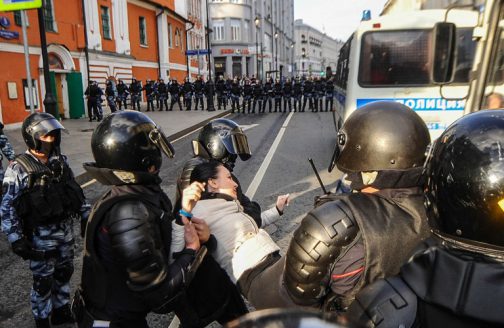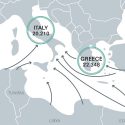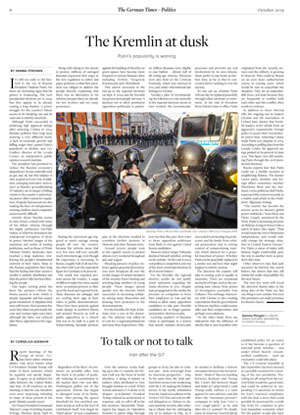The Kremlin at dusk: Putin’s popularity is waning

It’s still too early to bid farewell to the era of Russian President Vladimir Putin. Yet there are increasing signs that his power is weakening. The next presidential elections are in 2024, but they appear to be already casting a long shadow. A power struggle for the country’s future seems to be breaking out and its outcome is entirely uncertain.
Although Putin succeeded in achieving high approval ratings after annexing Crimea in 2014, Russian pollsters have long been noticing a very different trend. A lack of economic growth and falling wages have caused Putin’s popularity to decline, says Lev Gudkov, director of the Levada Center, an independent public opinion research institute.
The president had promised to reduce the Russian economy’s dependence on raw materials such as gas and oil, but this reliance is now as great as it ever was. In addition, emerging innovative sectors, such as Russia’s groundbreaking IT industry, are in danger of falling victim to the country’s authoritarian power elite’s mania for regulation. Despotic bureaucrats are also making the lives of entrepreneurs running medium-sized companies unnecessarily difficult.
Activist Alexei Navalny seems to have struck a chord with many of his fellow citizens through his highly politicized YouTube videos, in which he denounces the widespread corruption of those in power. Internet images of the mansions and yachts of leading politicians, such as those of Prime Minister Dmitry Medvedev, have reached a large audience, reinforcing the people’s fundamental mistrust of their rulers. Many in the Russian population have long had the feeling that their society’s wealth is unfairly distributed and that the power elite has been fleecing the people.
One major turning point has been the pension reform the Duma passed in 2018, which is deeply unpopular and has caused great resentment. It stipulates that men will receive their pension five years later than was previously the case and women eight years later, although the latter was reduced after fierce opposition to the regulation. Along with taking to the streets in protest, millions of outraged Russians expressed their anger at the new regulation in online and paper petitions so that their president was obliged to address the people directly, explaining that there was no alternative to his reforms, because there are already too few workers and too many pensioners.
Raising the retirement age triggered so much outrage among people all over the country because the reforms mean that very few men will ever actually reach retirement age, even though life expectancy is increasing. In Russia, roughly half of all men live into their 65th year; the equivalent figure for Germany is 85 percent.
The result was repeated protests across the country. A range of different topics has since caused more occasional protests to flare up at the local and regional levels. Many Russians are unhappy and are venting their rage at their rulers in public demonstrations. There have been protests against waste dumps in northern Russia and around Moscow as well as public opposition to a church that was to be built in a park in Yekaterinburg. Sporadic protests against the building of churches on green spaces have become more frequent in various Russian cities, including Nizhniy Novgorod, Krasnoyarsk and Chelyabinsk. This unrest increased in the run-up to the regional elections on Sept. 8, 2019; and the Kremlin has grown increasingly nervous. A decision not to allow prominent opposition politicians to participate in the elections resulted in countless further protests in Moscow and other Russian cities.
Around 50,000 people took to the capital’s streets to protest almost every weekend throughout July and August.
Shocking pictures of police violence against peaceful demonstrators were broadcast all over the world, images of armed members of the security forces beating and arresting large numbers of young people. These images spread quickly over the internet, which succeeded in increasing solidarity among many Muscovites and drawing more protesters to the demonstrations.
For the Kremlin, the Sept. 8 elections were a test of the electorate. The citizenry was called on to vote for 11 regional parliaments and more than 16 governors. Fifty-six million Russians were eligible to cast ballots – almost half of all voting-age citizens. Elections were also held on the Crimean Peninsula, which was annexed in 2014 and under international law belongs to Ukraine. Navalny’s plan of recommending his followers to vote tactically in the regional elections seems to have worked. His recommendation was that they give their votes to those opposition politicians most likely to win against United Russia candidates.
Moscow mayor Sergey Sobyanin declared himself satisfied, writing on his website, “In the end, it was a real political competition and one of the most emotional elections in all of recent history.”
For the Kremlin, the regional election results do not justify much optimism regarding the Duma elections in 2021. Despite state propaganda in the media, the pressure on companies to force their employees to vote and the refusal to allow many opposition candidates to take part, Kremlin candidates are no longer guaranteed positive election results.
Growing numbers of Russians refuse to participate in a system that merely imitates democratic processes and prevents any real involvement by its own citizens. Many prefer to stay home at election time; as far as they’re concerned, there’s nothing to vote for anyway. No one can say whether Putin will one day be replaced peacefully through either elections or retirement. At the end of President Boris Yeltsin’s time in office, Putin succeeded in protecting his predecessor and his family from criminal prosecution and in seizing control of compromising material, which allowed for a peaceful transition of power. Whether Putin can be peacefully replaced in a similar way and how that might happen is entirely unclear.
The direction the country will take in coming years is equally as uncertain. There are occasional moments of hope, such as the surprising June release from prison of investigative journalist Ivan Golunov. The exchange of prisoners with Ukraine is also creating expectations that the governments in Moscow and Kiev could resume talks and find compromises, and perhaps even solutions.
On the other hand, there are indications that the influence of siloviki, that is, men in politics who originated from the security services and the military, is growing in Moscow. They could set Russia on an even more authoritarian course in coming years, which would be sure to exacerbate the situation. They are an unpredictable force, not least because they are frequently in conflict with each other and this conflict often results in violence.
In addition to these internal rifts, the ongoing war in Eastern Ukraine and the annexation of Crimea have shown that Kremlin leaders won’t shrink from an aggressive expansionist foreign policy to secure their own domestic power base. Annexing Crimea made Putin very popular in 2014. According to polling data from the Levada Center, his approval ratings peaked at 89 percent in June 2015. This figure was still sustaining Putin through the 2018 presidential elections.
Russia experts fear that Putin could use a similar scenario in neighboring Belarus. The former Green party member and foreign affairs committee member Marieluise Beck and her husband, Green politician Ralf Fücks, expressed this concern recently in a widely read article in the Frankfurter Allgemeine Zeitung.
“The country has become the newest arena for Russia’s global power ambitions,” warn Beck and Fucks. Largely unnoticed by the West, Putin is increasing pressure on Belarus, trying to force it into a union of states, they argue. “That would mean the end of Belarusian independence and would radically change the strategic situation in Central Eastern Europe.” For Putin, a union of states with Belarus might comfortably pave the way to another term as president, they note.
Other observers may find such scenarios far-fetched, but recent history has shown that they fall within the realm of possibility for the near future.
The next few years will reveal the direction Russia takes in the dying days of the Putin era. But one thing is now certain: Not even this president can make promises for Russia’s future.
Gemma Pörzgen
Gemma Pörzgen is a Berlin-based journalist specializing in Eastern Europe. She is also editor-in-chief of the magazine Ost-West. Europäische Perspektiven (East-West. European Perspectives).




